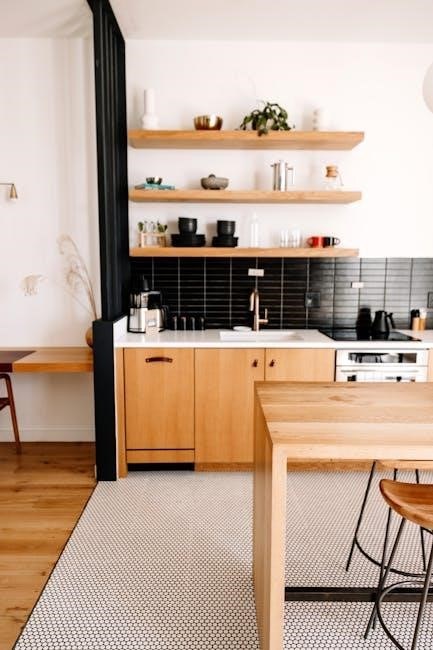Creating clear house rules is essential for both hosts and guests to ensure a smooth stay. These guidelines outline expectations, responsibilities, and property-specific regulations. Downloading a PDF template helps hosts maintain consistency and compliance with local laws, fostering respect and safety for all parties involved while providing a seamless experience.
Understanding the Importance of House Rules
House rules are vital for protecting your property, ensuring guest safety, and fostering a respectful environment. They clarify expectations, prevent misunderstandings, and help hosts maintain control. By setting clear guidelines, hosts can safeguard their assets and ensure compliance with local regulations. Guests also benefit from knowing what to expect, creating a smoother stay. Well-crafted rules promote mutual respect and a pleasant experience for everyone involved.
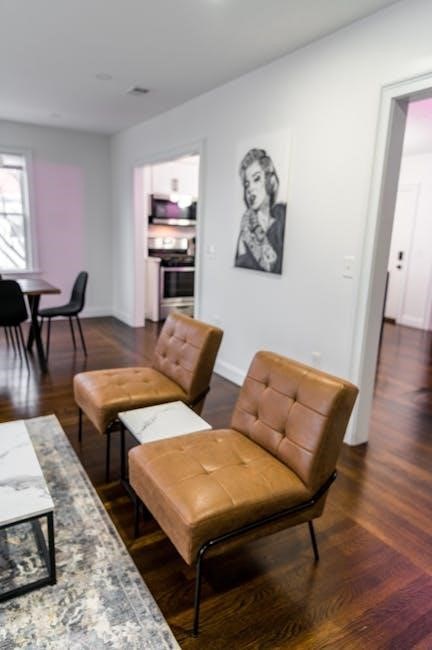
Why House Rules Are Essential for Airbnb Hosts
House rules protect your property, ensure guest safety, and facilitate smooth stays. They prevent misunderstandings, promote respect, and help hosts maintain control while complying with local regulations.
Protecting Your Property
House rules help safeguard your property by setting clear guidelines for guests. They prevent damage, noise disturbances, and unauthorized use, ensuring your space remains intact. Specific rules, such as no shoes indoors or limiting visitors, reduce wear and tear. By outlining expectations, hosts minimize risks and maintain control, fostering a respectful environment for both the property and guests. This ensures long-term preservation and value of your investment.
Ensuring Guest Safety
House rules play a crucial role in ensuring guest safety by establishing clear guidelines for behavior. Prohibiting hazardous activities, such as indoor smoking or unauthorized gatherings, minimizes risks. Quiet hour policies reduce disturbances, while pet and visitor restrictions help maintain a secure environment. These rules create a safe space for guests and hosts, fostering a respectful and accident-free experience for all parties involved during their stay.
Facilitating Smooth Stays
House rules are designed to facilitate smooth and enjoyable stays for guests. By outlining expectations such as quiet hours, check-in and check-out times, and visitor policies, hosts ensure a stress-free experience. Clear guidelines prevent misunderstandings, allowing guests to focus on their stay while respecting the property. These rules also help maintain order, ensuring a seamless experience for both guests and hosts, fostering a positive and harmonious environment during their stay.
Creating an Effective House Rules Template
Developing a clear and comprehensive house rules template is crucial for ensuring a smooth experience for both hosts and guests. Start by defining the purpose of your rules, focusing on property protection, guest safety, and fostering a harmonious stay. Include essential sections such as guest responsibilities, noise regulations, and specific property rules like prohibitions on parties or pets. Consider your property’s unique characteristics and location, incorporating area-specific guidelines to address particular needs, such as coastal rules for sand removal or water usage in a beach house. Additionally, ensure compliance with local short-term rental laws, outlining necessary permits and guest limits to avoid legal issues. Communicate these rules clearly to guests through various channels, like a welcome email or a printed copy upon arrival. Utilize a flexible digital template that allows for easy updates and maintains professionalism, ensuring it is adaptable to feedback and changing circumstances. By organizing these elements thoughtfully, you can create a template that is both protective and welcoming, enhancing the overall Airbnb experience for everyone involved.
Defining the Purpose of Your House Rules
Defining the purpose of your house rules ensures clarity and mutual understanding between hosts and guests. It establishes expectations for property care, guest conduct, and safety, while also outlining legal and regulatory compliance. A well-defined purpose fosters respect for the space, prevents misunderstandings, and creates a positive experience for all parties. This foundation helps maintain order, protect your investment, and encourage responsible behavior during stays.
Essential Sections to Include
Your Airbnb house rules PDF should include key sections to protect your property and ensure a smooth guest experience. Essential elements are check-in and check-out times, pet policies, quiet hours, and no-smoking rules. Additionally, outline expectations for visitor numbers, waste disposal, and device usage. Including safety guidelines and emergency contact information is crucial. These sections clarify responsibilities and prevent potential conflicts, ensuring a respectful and secure environment for both hosts and guests.
Downloading and Using a PDF Template
Downloading a PDF template for Airbnb house rules simplifies the process of creating clear guidelines. These templates are customizable, allowing hosts to tailor rules to their property’s specific needs. Many templates include sections for check-in times, pet policies, and noise levels. By using a PDF, hosts ensure consistency and professionalism, making it easy for guests to understand expectations. This format is also easily shareable and printable for display.
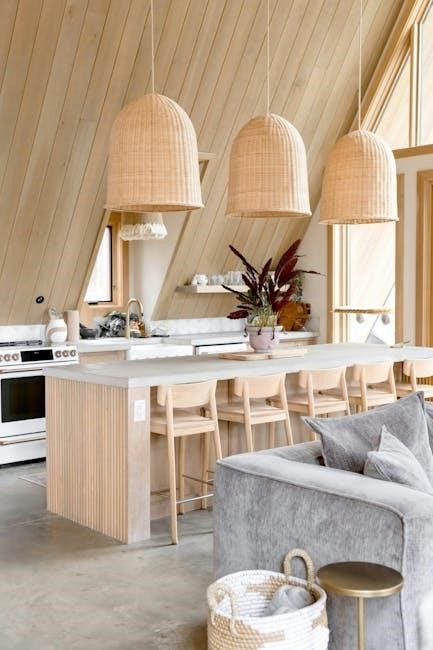
Common Airbnb House Rules
Common Airbnb house rules typically include no parties, pet restrictions, quiet hours, no smoking indoors, and check-in/check-out times. These guidelines ensure a respectful and safe environment for all guests. Properly outlining these rules in a PDF template helps hosts maintain order and clarity, while guests understand their responsibilities during their stay. This approach fosters mutual respect and a smooth experience.
No Parties or Events
Prohibiting parties or events is a common rule to protect your property and ensure a peaceful environment for neighbors. This rule helps prevent noise disturbances, property damage, and overcrowding. Clearly stating this in your Airbnb house rules PDF sets expectations and deters violations. Guests must agree to refrain from hosting gatherings, ensuring safety and maintaining a respectful atmosphere. Consequences for breaches, such as additional fees or removal, should be outlined to enforce compliance effectively.
Pet Policies
Establishing clear pet policies helps protect your property and ensures harmony with guests. Specify if pets are allowed, including restrictions on size, weight, or breeds. Guests should be responsible for cleaning up after pets and preventing damage. Clearly outline any additional fees or deposits for pets in your Airbnb house rules PDF. This helps avoid disputes and ensures a stress-free experience for both hosts and pet-owning guests.
Quiet Hours and Noise Levels
Designating quiet hours is crucial for maintaining a peaceful environment, especially in residential areas. Specify noise level expectations, typically after 10 PM, to minimize disturbances. Guests should be aware of the importance of keeping noise to a minimum to respect neighbors and other guests. Include this in your Airbnb house rules PDF to ensure everyone understands the expectations, fostering a harmonious stay for all parties involved while preserving your property’s reputation.
No Smoking Indoors
Prohibiting smoking indoors is a common rule to protect your property and ensure a clean environment for future guests. Specify that smoking is only allowed in designated outdoor areas, if permitted. Emphasize that failure to comply may result in additional cleaning fees to remove odors or stains. Including this in your Airbnb house rules PDF helps maintain your space’s integrity and provides a smoke-free experience for all guests.
Check-In and Check-Out Times
Establishing clear check-in and check-out times is crucial for maintaining order and respecting both guest and host schedules. Specify exact times to avoid confusion and ensure smooth transitions between stays. Guests must adhere to these times unless otherwise agreed upon in writing. Clearly outline the consequences of late check-outs or early arrivals in your Airbnb house rules PDF to prevent disputes and maintain a seamless experience.
Enforcing House Rules Effectively
Enforcing house rules effectively requires clear communication, consistency, and defined consequences for violations. This ensures accountability and a respectful experience for both hosts and guests.
Consequences of Violations
Violating house rules can lead to penalties, additional fees, or even eviction. Hosts may charge guests for damages or cleaning fees and report violations to Airbnb. Consequences ensure accountability, maintaining respect for property and shared spaces. Clear enforcement of these repercussions helps uphold the integrity of the rental agreement and fosters a responsible environment for all parties involved.
Clear Communication with Guests
Effective communication is key to ensuring guests understand and respect your house rules. Clearly display the rules in your listing and provide a printed or digital copy upon check-in. This transparency helps prevent misunderstandings, fostering mutual respect and a safe environment. Regular reminders and open dialogue can also encourage adherence, making the stay enjoyable for everyone involved while protecting your property and interests.
Customizing Rules for Your Property
Property-specific rules ensure safety, respect, and compliance with local regulations. Tailor your guidelines to suit your property type, location, and unique needs for a seamless guest experience.
Considering Property Type
When crafting Airbnb house rules, consider your property type. Apartments may require noise restrictions, while houses might need outdoor space guidelines. Condos often have specific guest policies, and vacation homes may need check-in/time rules. Tailoring rules to your property ensures clarity and prevents misunderstandings, creating a fair and enjoyable experience for both hosts and guests.
Location-Specific Rules
Location-specific rules are crucial for compliance with local regulations. Properties in urban areas may require noise restrictions, while coastal locations might need beach cleanup guidelines. Rural areas could include rules about wildlife respect, and historic neighborhoods might enforce architectural preservation. Tailoring rules to your property’s location ensures adherence to local laws and community standards, fostering harmony and protecting both guests and the environment.

Digital vs. Physical Display of Rules
Digital and physical rule displays offer unique benefits. Digital versions, like PDFs, are easily shared via email or apps, ensuring accessibility. Physical signs placed strategically remind guests of key guidelines, reinforcing compliance and convenience for all parties involved;
Pros and Cons of Each Method
Digital rule displays, like PDF templates, offer convenience and accessibility, easily shared via email or apps. They ensure clarity and updates in real-time. However, guests might overlook digital formats. Physical signs provide constant visibility and serve as quick reminders but require printing and strategic placement. While physical signs are tactile and immediate, they can be costly to update and may clutter spaces. Both methods complement each other for effective communication.
Understanding Local Regulations
Researching and complying with local laws is crucial for Airbnb hosts. Regulations may include permits, licensing, and restrictions on short-term rentals, ensuring legal and safe operations.
Compliance with Short-Term Rental Laws
Understanding local regulations is vital for Airbnb hosts. Many cities enforce specific rules for short-term rentals, such as licensing requirements or restrictions on rental periods. For example, only 12 NSW councils permit short-term rentals, while cities like Berlin enforce strict regulations. Hosts must adapt their house rules to comply with these laws, ensuring legal operation and avoiding penalties. Staying informed and updating rules regularly is essential for maintaining compliance and a smooth hosting experience.
Impact on Your House Rules
Local regulations significantly influence your house rules. For instance, cities like Berlin enforce strict short-term rental laws, requiring hosts to adhere to national and European guidelines. In NSW, only 12 councils permit short-term rentals, mandating specific planning controls. These regulations shape your house rules, ensuring compliance and legal operation. Hosts must tailor their rules to local laws, such as permit requirements or rental duration limits, to avoid penalties and protect their property while maintaining guest satisfaction.
Handling Rule Violations
Address violations promptly by reviewing the situation, communicating clearly with guests, and documenting incidents. Escalate if necessary, ensuring fairness and adherence to your house rules policy.
Step-by-Step Approach for Hosts
Assess the Situation: Review the violation and gather evidence. Ensure the issue aligns with your house rules and local regulations. Stay calm and objective.
Communicate Clearly: Contact the guest via Airbnb’s platform to discuss the violation. Provide specific details and reference your house rules PDF.
Document Everything: Keep a record of interactions, including photos or videos if applicable. This documentation may be crucial for resolving disputes.
Take Action: If necessary, charge additional fees for damages or report the incident to Airbnb. Follow their dispute resolution process for support.
Prevent Future Issues: Use the experience to refine your house rules and ensure clarity for future guests.
Optimizing Your House Rules
Regularly update your house rules PDF to reflect guest feedback and local regulations. Customize templates to ensure clarity, compliance, and a seamless experience for all parties involved.
Gathering Guest Feedback
Gathering guest feedback is crucial for refining your Airbnb house rules. Use your PDF template to collect insights on clarity and effectiveness. Guests often provide valuable suggestions on improving rule understanding. Regularly review comments to identify areas needing adjustment. This ensures your rules remain fair, clear, and aligned with guest expectations, fostering better compliance and overall satisfaction. Feedback helps enhance the guest experience while protecting your property.
Updating Rules Regularly
Regularly updating your Airbnb house rules ensures compliance with changing local regulations and evolving guest needs. Review and revise your rules annually or as local laws require. Incorporate guest feedback to address overlooked areas and improve clarity. Use your PDF template to make adjustments seamlessly. Updated rules help maintain a fair and safe environment, ensuring both hosts and guests are aligned with current expectations and legal standards.
Case Studies and Real-Life Examples
Real-life examples highlight how hosts improved their listings by implementing clear house rules. Templates helped reduce noise complaints and property damage, ensuring smoother guest experiences and compliance with local regulations.
Learning from Other Hosts
Successful Airbnb hosts often share how implementing clear house rules has reduced issues like noise complaints and property damage. Many use downloadable PDF templates to outline expectations, ensuring guests understand their responsibilities. For example, one host reported fewer disruptions after adding specific quiet hours, while another emphasized pet policies to protect their property. These strategies not only prevent conflicts but also foster mutual respect and accountability.
Tools and Resources
Essential tools for creating Airbnb house rules include PDF templates and design platforms. Use Uplisting for templates and Canva for custom designs to enhance your listings.
Templates and Software
Utilize Uplisting for comprehensive Airbnb house rules templates and Canva for customizable designs. Tools like these offer pre-designed formats, ensuring consistency and professionalism. Downloadable PDF templates simplify the process, allowing hosts to tailor rules to their property. These resources help maintain clarity, legality, and aesthetic appeal, making it easier to communicate expectations to guests effectively while saving time and effort in creating from scratch.
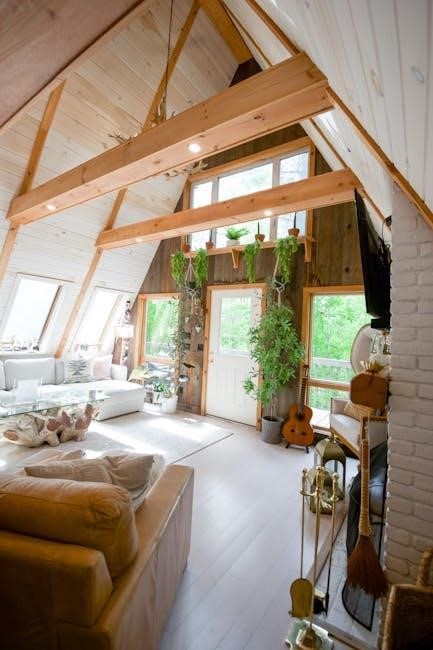
Best Practices for Hosts
Clearly communicate expectations, be reasonable, and remain flexible; Ensure rules are fair and easy to follow, fostering trust and positive experiences for both hosts and guests.
Clear Communication
Effective communication is key to ensuring guests understand and adhere to house rules. Clearly outline expectations in your Airbnb house rules PDF to avoid misunderstandings. Specify check-in times, quiet hours, pet policies, and prohibited activities. Provide contact information for emergencies and include a section for guests to acknowledge they’ve read and agreed to the rules. This approach fosters mutual respect, enhances safety, and ensures a smooth experience for both hosts and guests.
Being Reasonable and Flexible
While house rules are essential, it’s important to remain reasonable and flexible. Guests appreciate hosts who can accommodate minor exceptions, such as late check-outs or occasional visitors, when possible. Striking a balance between enforcing rules and being understanding fosters positive reviews and repeat bookings. Clearly communicate your expectations in your Airbnb house rules PDF while showing empathy, ensuring guests feel respected and valued during their stay.
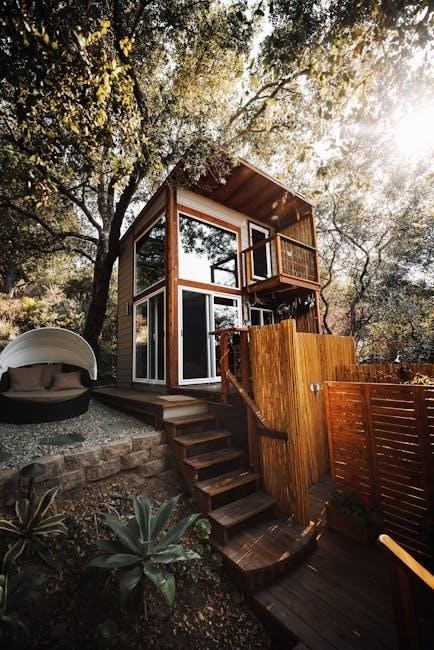
Future Trends in House Rules
Future trends include integrating smart home technology, like automated locks and voice assistants, to enforce rules seamlessly. This enhances security and streamlines guest experiences, making Airbnb house rules PDF more efficient and adaptable for modern rentals.
Smart Home Integrations
Smart home devices are revolutionizing Airbnb house rules by automating enforcement. Locks, thermostats, and noise monitors can be controlled remotely, ensuring compliance. For example, noise sensors can alert hosts if sound levels exceed agreed limits, while smart locks enforce check-in/out times. These integrations enhance security, streamline communication, and provide real-time monitoring, making it easier to manage properties efficiently while maintaining guest comfort and adherence to house rules.
Establishing clear house rules is crucial for protecting your property, ensuring guest safety, and facilitating smooth stays. Use a PDF template to maintain consistency and legal compliance, fostering positive experiences for both hosts and guests while preserving your property’s integrity and reputation in the long term.
Final Thoughts and Recommendations
Effective house rules are vital for a harmonious hosting experience. Always use a PDF template to ensure clarity and legal compliance. Communicate rules clearly to guests, be flexible when reasonable, and update regulations as needed. Regularly gather feedback to refine your rules and maintain a balance between protecting your property and ensuring a positive guest experience. This approach fosters trust, safety, and long-term success for your Airbnb venture.
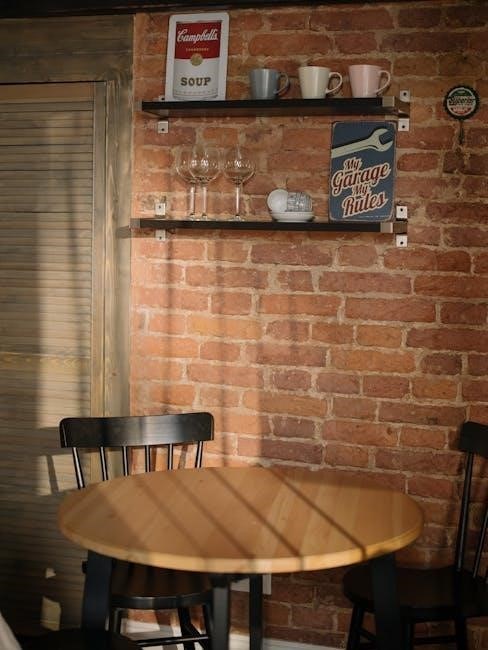
References
For further insights, explore Airbnb’s Help Center and Uplisting’s resources on house rules templates and best practices for hosts.
Further Reading and Resources
For deeper insights, explore Airbnb’s official guidelines and downloadable templates from Uplisting. Additionally, websites like Vacation Rental Formula offer expert tips and customizable PDFs to refine your house rules. These resources provide practical tools and legal insights to help hosts create effective and enforceable guidelines for their properties.
